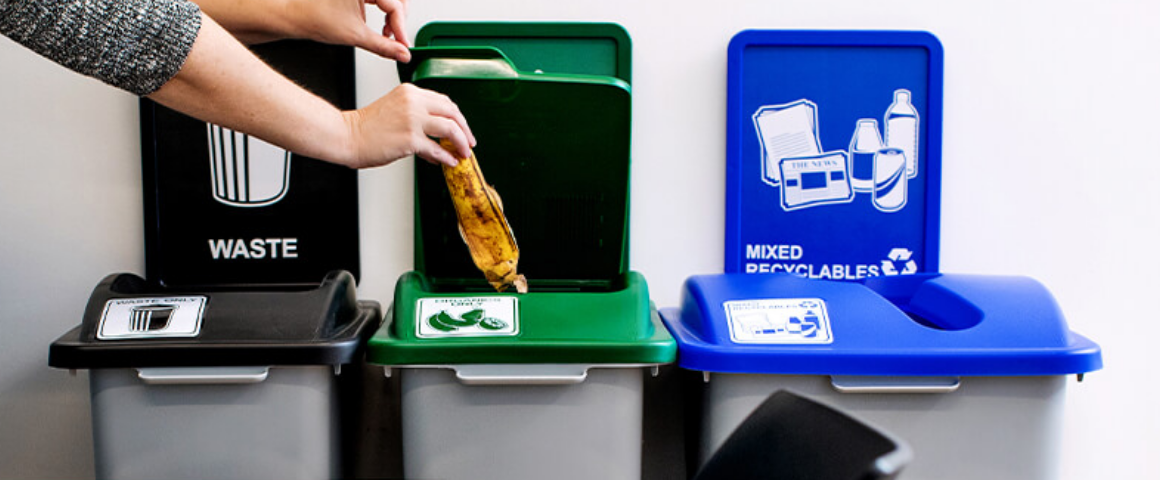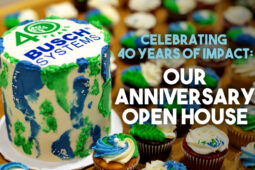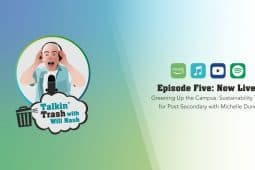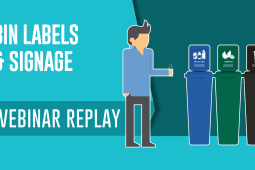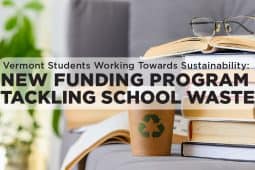Food for Thought: A Breakdown of Organic Waste Programs & Regulations
You may have noticed a lot of people have food on the brain lately – well, food waste, that is! States like California and Massachusetts are beginning to mandate organics diversion programs, and organizations across Canada and the US are moving compost collections to the top of their priority list.
While some jurisdictions have had ‘green bin’ programs running for a while, many others are looking to start or ramp up their own for the first time. Some are at a loss for where to start, and others are just wondering – WHY?
Have no fear! Busch Systems is here with a breakdown of what’s going on in the organic waste world, why making these changes is so important, and how you can start or upgrade an organic waste program as painlessly as possible!
First things first – what is ‘organic waste’?
Organic waste is biodegradable material that can decompose into useful materials (soil, biofuel, etc.) when ‘returned to the earth’. You’ve heard of Reducing, Reusing, and Recycling, right? Well, dealing with organic waste is the 4th R – “Re-Earthing”!
Organic waste can include food scraps, landscaping waste, wood, paper products, manure, organic textiles, and more – it all depends on what your local facilities can effectively process into useful materials.
What materials are collected as organic waste?
In general, your best & first resource will be the party hauling your organic waste. That could be your own private hauler, or your municipality/jurisdiction governing body (cities, counties, or special districts providing waste collection services). The party that takes your waste away will be able to tell you what is organic waste, what is recycling, and what is still going to the landfill.
Why should we collect organic waste separately from landfill-destined materials?
Separating organic waste and keeping it out of our landfills is one of the most impactful ways we as individuals (and organizations as a whole) can help take care of our planet, and by extension, our communities. Streamlining and further reducing what is sent to landfills ensures those areas are only for materials that have no higher/better use. It keeps landfills smaller & easier to manage and greatly reduces the harm to people and the planet (due to lower amounts of landfill gases).
Food waste and other compostable material also have a high reuse & recycle value. Leftover, consumption-safe food can be donated to food banks, shelters, and other community organizations, food scraps not suitable for human consumption can be diverted to animal feed, waste oils and food scraps can be converted into fuel or other types of energy, and composting creates nutrient-rich soil additives to assist in future food production. For specific examples and more information on the many uses for organic waste, you can access the Environmental Protection Agency (EPA)’s Food Recovery & Compost resource page.
And finally, you may need to start an organic waste program simply because you’ve been told you have to. Many states, provinces, municipalities, and other jurisdictions are starting to ban organic waste from landfills and are implementing mandatory food waste & compost programs. If you need to add to or adjust your waste collection practices because of new regulations coming down the pipe, we’ve broken down some location-specific resources for you below!
Why are so many jurisdictions mandating organic waste programs?
Aside from the reasons already listed above, the main motivation behind these programs is to reduce emissions of methane gas. When organic waste (like food) breaks down in a landfill, it rots instead of decomposing and produces methane gas. Methane is the second most prevalent greenhouse gas after carbon dioxide (20 percent of greenhouse gas emissions globally), and methane is 25 percent more potent than carbon dioxide at trapping heat in the atmosphere.
‘Re-earthing’ organic waste into usable materials such as compost soil and biofuel, or diverting it altogether, will significantly reduce the amount of methane released into the atmosphere, and go a long way toward slowing down climate change.
How do I know what my jurisdiction’s organic waste regulations are?
Good question! Just like how the exact material that can be collected as organic waste can vary from one jurisdiction to the next, the rules & regulations surrounding organic waste programs can vary too. For this reason, your best first resource is your individual waste hauler. The parties that take away your waste will know exactly how any mandates & regulations affect individuals and organizations, and will be able to give you firm action items to ensure your program aligns with their legislation-compliant waste collection. If you do need to establish a new hauler contract, or modify an existing one, to accommodate new organic waste programs, Recycling Works MA offers excellent guidance (and further hauler-related resources) here.
You can also look to your individual jurisdiction’s governing body to find out what rules are in place, and/or are coming down the pipe soon. To assist with this, we’ve popped around and collected a few summaries of areas we know are updating their food waste legislation, or already have food waste bans in place.
We should also mention that while the focus below is on food waste bans, many states also already have yard waste bans in place (this website has a good list of American organic waste mandates in place). And, in addition to the jurisdictions listed below, New York, Connecticut, Rhode Island, New Jersey, Oregon, and Washington also have varying forms of food waste mandates.
CALIFORNIA:
Starting this year (2022), California will require residents and businesses to recycle organic waste, and all jurisdictions must provide organic waste collection services. The full Bill can be found here, and you can find out more info about these new requirements here.
MASSACHUSETTS:
Massachusetts – a state that already has organic waste legislation in place – is expanding its disposal bans, according to their new solid waste master plan. Starting in November 2022, disposal of organics from locations generating more than a half-ton per week will be prohibited. There are also plans to consider a full ban on disposal of any and all organics by 2030.
You can find more info about the current bans & future plans here, and check out a quick Fact-Sheet overview of food waste composting in Massachusetts here.
VERMONT:
In 2020, Vermont banned the disposal of food waste in the trash and landfills. This means Vermont haulers must offer organic collection services to non-residential customers and apartments with 4 units or more. As a result, the state has seen food donations nearly triple since the law was passed.
You can find out more about Vermont’s regulations – and the results so far – in the state’s Waste Management & Prevention Division Solid Waste Program Guidance Booklet.
Curious about your state’s organic waste regulations? Check out this interactive map, or hop over to the Center for EcoTechnology (CET) to access resources and information organized by state.
CANADA:
Canada has a nation-wide food policy – with an identified action area of reducing food waste – and has singled out reducing food loss and waste as an integral part of preserving our environment and combatting climate change.
Many individual provinces also have their own organic waste regulations in place. For example, Ontario (where Busch Systems calls home) upgraded their waste diversion efforts with the Waste-Free Ontario Act in 2016, and implemented a Food and Organic Waste Framework in 2018 to work with municipalities to keep organic waste out of landfills. Nova Scotia banned organics in landfills in 1998, and municipalities in British Columbia have implemented their own bans through the 2010s as well.
Okay, I need to implement or upgrade an organic waste collection program – where do I start??
Deep breaths – we are here to help! There are many, many resources other than the links above that can help you put your organic waste goals into practice. Before we take a deep-dive here, we wanted to list a couple of those resources that are specifically geared toward helping you navigate and adapt to legislated organic waste programs and bans:
- Into the Green Bin: Collecting Food Waste from Institutional Settings – the replay & recap of our January 2022 webinar, complete with a comprehensive list of resources & downloads provided by our panel of experts!
- BANS AND BEYOND: Designing and Implementing Organic Waste Bans and Mandatory Organics Recycling Laws
- Comply with the Organics Waste Ban (Massachusetts-centered)
- Sustainable Management of Food
Now – where to start! A solid first step, no matter which path you choose, is to start with examining the waste your building/facility/organization currently generates. Knowing what kinds of waste you have to deal with, and what specific materials are going into your waste stream, will help you plan your path forward to reduce, divert, collect, and dispose of all your waste (including any organic waste). You can learn more about the benefits of and steps to auditing your waste here. You can also use this free Food Waste Estimator to get a good picture of your current food scrap waste.
After you have a clear overall picture of your waste composition – and exactly which materials in your waste stream can be considered organic waste – you can stick to the US EPA’s official food waste hierarchy for guidance. Or, in other words, follow the 3 “R’s” below to ramp up or start your own organic waste programs:
1. REDUCE:
The first consideration many eco-waste educators will suggest is to look at how you can REDUCE the amount of organic waste you generate. The less overall waste you produce, the less organic waste you’ll need to divert & sort for disposal! Start by looking at the organic waste you are currently generating and examine where substitutions, reductions, and alternative behaviours can be implemented to stop certain types of materials from becoming organic waste in the first place.
Examples of possible strategies are: offering reusable food containers/utensils as opposed to single-use (plates, cups, trays, utensils, etc. that can be cleaned and reused), reducing the volume of surplus food onsite (audit what food is produced/offered/consumed and make adjustments to limit or eliminate leftovers), offering only unpackaged/plastic-free food, and/or investing in organics storage (to prevent materials from going bad, expiring, or turning into waste before they can be used). For more waste prevention resources, head over to our Into the Green Bin blog post here.
2. REUSE/RECYCLE:
Next, take a look at how the organic waste you do need to generate can be put to a secondary use. There are quite a few paths you can use to divert materials away from becoming hauler-destined waste, and these paths will often directly benefit your own organization and community at the same time.
Examples of possible organic waste REUSE are: donating consumable leftover food to food banks, shelters, and local community organizations, sending food scraps not suitable for human consumption to where they can be used for animal feed, and/or starting an in-house composting program. This compost can be used to fertilize community gardens, assist in the health of plants & greenery within or around your location, or could even create a closed-loop system if you use your food-scrap-generated compost to grow and produce food for your own consumption (like a vegetable or herb patch that supplies some food for in-house cafeterias or lunchrooms).
NOTE: Aside from being better for the environment, reducing, reusing, and recycling organics (diverting those materials away from the waste stream entirely) can greatly reduce the costs associated with waste management and hauling. If you do need to establish a new hauler contract, or modify an existing one, because of these positive changes, Recycling Works MA offers excellent guidance (and further hauler-related resources) here.
3. RE-EARTH:
A newly added 4th “R”, re-earthing refers to the process of turning organic waste into useable compost & biofuel. In general, this is what is done with the organic material that you are not able to divert or reduce, and as a result is taken away by a waste hauling company. We strongly encourage you to open the lines of communication with your waste hauler to find out exactly where your organic waste is going, and what it is ultimately used to create. Not every hauler or waste processing plant is the same, and due diligence will go a long way in ensuring your organic waste is being put to its best use after it leaves your facility.
To set yourself up for success in this area, clearly designated bins to collect organic waste separately from recycling and landfill-destined materials will help keep contamination & maintenance costs low, and participation & program effectiveness high. The recap of our ‘Bin There, Learned That’ networking webinar on our blog is a great summary of guiding considerations (questions to ask) and resources (places to find answers) when planning out your waste bin infrastructure, including bin signage, placement, and more. If you want to deep-dive into waste bin best-practices, our blog series “Signage Conversations with Brenda Pulley” gives a much more in-depth look at effective and successful signage, and this post gives a good breakdown of how centralized bin stations can be a better alternative to individual waste bins for lower contamination, higher program participation, and overall safer operations. Finally, for more organic waste bin & program best-practices, you can head right over to our Into the Green Bin webinar replay & summary post!
Have questions or need a hand designing and implementing your optimal organic waste program? We are here to help! Reach out to our team of experts (sales@buschsystems.com) for guidance & support as you up your organic waste game.
